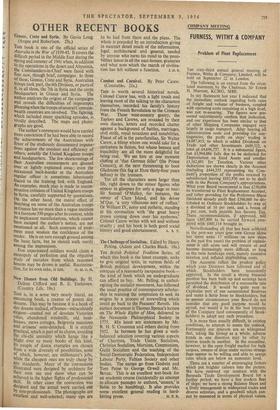OTHER RECENT BOOKS
Greece, Crete and Syria. By Gavin Long. (Angus and Robertson. 25s.)
This book is one of the official series of Australia In the War of1939-45. It covers the difficult period in the Middle East during the spring and summer of 1941 when, in addition to the operations in the desert and Abyssinia, the Commanders-in-Chief were faced with four new, though brief, campaigns. In three of these, Greece, Crete and Syria, Australian troops took part, the 6th Division, or parts of it, in all three, the 7th in Syria and the corps headquarters in Greece and Syria. The author analyses the origins of the campaigns and reveals the difficulties of impromptu planning when the troops of several Common- wealth countries are involved. The fighting, which included many sparkling episodes, is vividly described. The maps and photo- graphs are good.
The author's comments would have carried more conviction if he had been able to record the achievements of the Australians with fewer of the studiously documented imputas tions against the conduct and efficiency of others, notably the United Kingdom troops and headquarters. The few shortcomings of their Australian counterparts are glossed over or lightly explained away; even the occasional back-hander at the Australian regular officer is sometimes laboriously traced to the training link with England. As examples, much play is made in uncon- structive criticism of United Kingdom troops In Syria, carefully supported by quotations. On the other hand, the moral effect of bombing on some of the Australian .troops in Greece has no more than a vague mention in a footnote 350 pages after its context, while its unpleasant manifestations, which cannot have escaped the author's notice, are not mentioned at all. Such contrasts of treat- ment must weaken the confidence of the reader. He is on sure enough ground among • the basic facts, but he should walk warily among the impressions. Few experienced soldiers would claim a Monopoly of perfection and the objective study of mistakes from which reasoned lessons may be drawn is useful. Recrimina- tion, for its own sake, is not. G. M. 0. D.


































 Previous page
Previous page